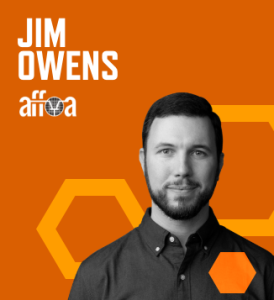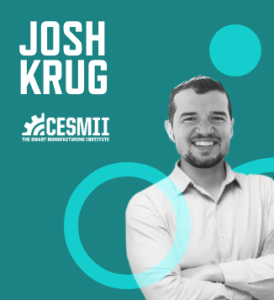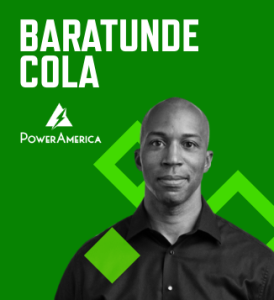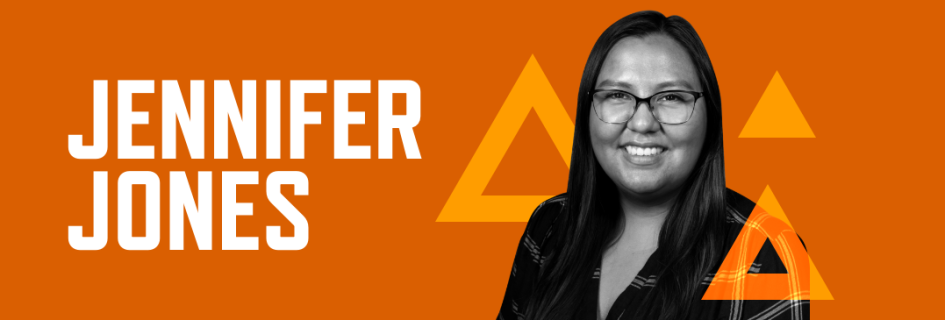
energy advocate, K-pop fan
Jennifer Jones is a champion for several of society’s highest-profile causes. By working at the intersection of STEM (clean energy and environmental analysis), social sciences (climate and energy justice), and public policy (Tribal Nations and environmental policy), she is able to support advanced manufacturing, her community, and STEM education.
Jennifer is a Diné (Navajo) Ph.D. student at the University of Wisconsin’s Nelson Institute for Environmental Studies. Her research is focused on the potential of Tribal-owned utility development to provide clean, reliable electricity for Tribal communities.
Jennifer has earned a dual bachelor's in Mechanical Engineering and American Indian Studies at Arizona State University (ASU) and a Master’s in Environment and Sustainability at the University of Michigan.
Some of her ASU connections are now involved in the newest Manufacturing USA institute, EPIXC (Electrified Processes for Industry without Carbon). EPIXC is developing solutions to help eliminate carbon emissions from industry. The institute works with unions, community colleges, and Tribal, Hispanic, and Black communities to recruit, train, and expand the clean energy workforce.
During Jennifer’s frequent visits to help her grandmother in remote Arizona, there was no electricity or running water in their hogan, a traditional Navajo hut. Her family relied on fossil fuels for heating and cooking. Jennifer felt the impact of these energy burdens and started pursuing studies in environmental and renewable energy to help her community.
For working to secure the future of sustainable U.S. manufacturing and advocacy for Tribal Nations, Jennifer Jones is a Modern Maker.
Q&A with Jennifer
How did you find your way to working in advanced manufacturing?
Growing up in Tempe, my family frequently traveled home to the Navajo reservation to support my Nálí [grandmother] and later my mom’s trust farmlands. We had no electricity access where we stayed. In pursuing my education, I learned these are examples of energy burden, injustice, and insecurity. As an enrolled Navajo Nation member, I have a personal stake in advancing electricity infrastructure with distributive, clean, and reliable energy sources for homes at the end of the line, like my grandparents.

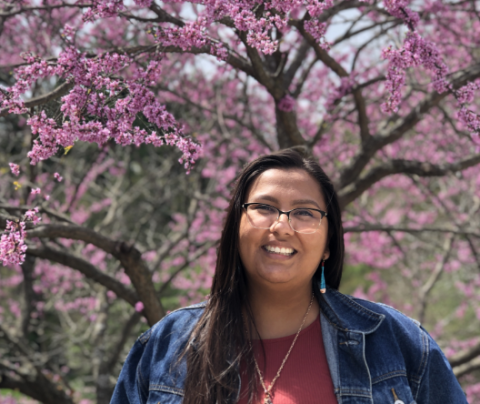
What is the most challenging part of your job?
I sometimes struggled with time management of my academic contributions and leadership, given my passions for supporting community and service and improvements. I find it difficult to stop working sometimes, or to start working again when I have returned from a hectic week at a conference. I have found that support from colleagues at the Nelson Institute and in the Energy Justice Working Group keeps me more aware of mental health and time management.
What is the best part of your job?
I enjoy participating in the American Indian Science and Engineering Society (AISES) National Conference and occasionally UW Madison's AISES Chapter meetings. AISES has been a large part of my academic journey, professional development, and career growth. Since joining in 2014, I held many leadership roles with the AISES ASU Chapter, and I have attended nine national conferences. I will be awarded a Sequoyah fellowship (lifetime membership with AISES) at my 10th AISES National Conference.
What would people be surprised to learn about manufacturing or your role in it?
People would be surprised at how manufacturing fits into the energy justice discussion.
Consider the alignment of construction areas, energy generators, and factories. Many indigenous groups are exposed to the origins of the manufacturing process like extraction of natural resources and metals. But manufacturing has ignored their voices for decades; voices that sought to be good stewards of the land, water, and air with intentions of protection and reciprocity.
People would also be surprised to know that indigenous energy leaders are starting to change manufacturing processes. Tribes with energy champions have developed off-grid solar farms, community microgrids, and even re-purposed a retired electric grid.
What advice do you have for someone new to the industry?
Take chances. As a sophomore at ASU, I went to my first AISES National Conference – I paid out of pocket to fly to Orlando. And it was the best decision. I would never have met an inspiring group of indigenous STEM nerds who I connected with, nor would I have ever secured my first internship experience with General Electric's Industrial Solutions.
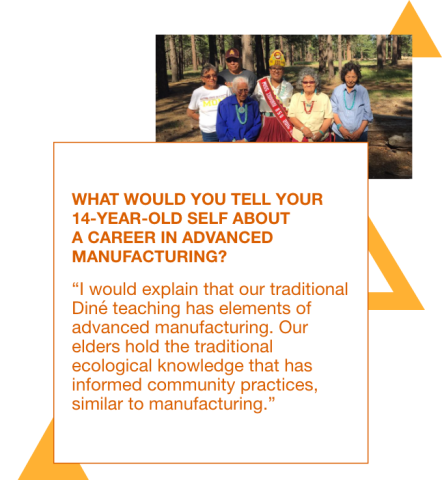
If you didn’t have to work, how would you spend your day?
Creating art – drawing, crocheting, or beading – while watching television or movies at home with the cats and dogs. I would also take the opportunity to return home and support my parents' retirement project: farming on the Navajo reservation.
What activity gives you the most energy?
Swimming at the recreation center has been an activity that pulls me from my laptop and phone screens. When I swim, I almost enter a meditative state. I can take the time to focus on my freestyle stroke and improve my speed. I do not imagine returning to my high school status on the swim team, but I have always been a fish out of water. So returning to the pool has been a great break from work this summer.
I am also a big K-pop concert-goer. I always enjoy spending time chatting with people in the VIP lines and exploring the city I’m in. Since my ultimate group, BTS, is on military hiatus, I hope to take a trip to Seoul, South Korea, for their return concert in 2025.


